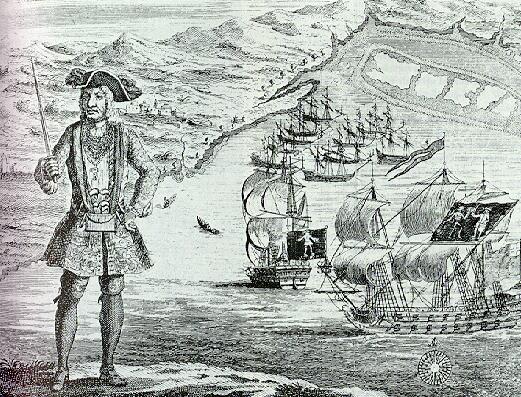
BARTHOLOMEW ROBERTS (1682-1722)
Bartholomew Roberts was born in Casnewydd Bach (Little Newcastle) in West Wales in 1682 and became one of the most successful pirates in the Golden Age of Piracy (1650s-1730s). He is believed to have had a relationship with John Waldon.
Terry Breverton in his The Book of Welsh Pirates and Buccaneers describes Waldon as a ‘hot-headed and argumentative man, known as ‘Miss Nanny’ by the crew.’ One ‘noted writer’ on pirates believes that ‘Miss Nanny’ was an 18th-century term for a homosexual, but Breverton cannot find any such reference, nonetheless, the ‘noted writer’ uses this to make the connection that Walden was Robert’s lover. Breverton asks surely this ‘fact’ would have been noted in the interrogations and trial transcripts of over 200 men. If anything, Breverton seems to think that Roberts was asexual. (Page 304)
Richard Sanders in If a Pirate I Must Be suggests Waldon’s nickname ‘Miss Nanny’ was for the ‘harshness of his temper’ and that he was ‘cruel and quick tempered’. (Page 210)
Sanders also discusses the origin of the term ‘buccaneers’:
‘They called themselves the Brethren of the Coast and developed a unique society, democratic and egalitarian. They knew each other by noms de guerre, each having undergone a baptism as they entered the tropics which they claimed freed them from all previous obligations. Their strangest practice was that of living in male couples. Together they would disappear into the forests for between six months and two years, emerging – unwashed, dressed in skins and covered in blood – only to sell meat and hides to passing ships.’ (Page 25)
Elsewhere, Sanders examines “Item VI” of Roberts’ Articles which banned men from bringing women onto the ship, on pain of death. “This was, in part, because they would be a source of tension. But it’s telling that boys were also barred. Given the circumstances of the pirates’ lives it would be surprising if there were no homosexual undercurrents on the Royal Rover. It may well be that the sexual ambiguity Johnny Depp brings to the lead role in Pirates of the Caribbean is one of the more accurate elements of the film, and that Robert’s men notices something similar in their solitary new commander. It probably disturbed them less than his aversion to wine.” (Page 80)
Roberts meets a young man called George Wilson:
“A number of witnesses later testified that Roberts and Wilson soon became ‘intimate’, even swearing a suicide pact together. ‘they two [used] often to say that if they should meet with any of the Turnip Man’s ships [an insulting term for King George I] … they would blow up and go to hell together,” one claimed. Roberts’ attachment is all the more striking because Wilson was lazy in his work and unpopular with the rest of the crew – so much so that, on one occasion, Roberts himself threatened to cut Wilson’s ears off … In this era, it was common for men to show emotions and express affection for each other in a way that would later be regarded as inappropriate. But Roberts and Wilson hardly knew each other. In total, their relationship would last for no longer than six weeks. They had no time to develop a deep and profound friendship and it’s hard to see what their ‘intimacy’ was based on if it wasn’t physical.” (Page 205)
At his trial for piracy, Wilson claimed that:
“his supposed ‘intimacy’ with Roberts was merely a ruse. If he paid Roberts ‘undue compliments and deference he did it with intention to ingratiate himself, and gain a good treatment from him … This was no more than what every prisoner endeavoured …” (Page 234)

Sources: Terry Breverton, The Book of Welsh Pirates and Buccaneers (Glyndwr Publishing, 2003); Richard Sanders, If a Pirate I Must be… : The True Story of Bartholomew Roberts – King of the Caribbean Pirates (Aurum Press, 2007)
HENRY MORGAN (c1635-1688)
Henry Morgan, born near Cardiff, was another great pirate. While not homosexual himself his friend Alexander Exquemelin, who served on his ship as a barber-surgeon, wrote of his time as a matelote. Exquemelin’s book, History of the Bouccaneers of America (1678), is one of the most important contemporary accounts of piracy.
James Neill in his book The Origins and Role of Same-Sex Relations in Human Societies wrote, ‘Among buccaneers of the Caribbean a formalized sexual relationship called matelotage was also common. The term originated in a master-servant context, but quickly came to denote a recognized sexual bond between a buccaneer and a lover, who was called a matelote. The ship’s surgeon on Henry Morgan’s ship, Alexander Exquemelin, had started out as a matelote to a pirate himself, and later wrote of the relationship with fondness.’ (Page 410)
Sources: James Neill, The Origins and Role of Same-Sex Relations in Human Societies, McFarland & Co., 2011)
1626
Francis Bacon, an English philosopher and statesman had a particular love for Welshmen. Sir Simonds D’Ewes describes Bacon’s love for his Welsh serving-men, in particular Godrick, a “very effeminate-faced youth” whom he calls “his catamite and bedfellow”.
1678
Claude Gellée, le Lorrain (1600 – 1682) paints Landscape with St Philip baptising the Eunuch and is purchased by Amgueddfa Cymru — National Museum Wales in 1982.